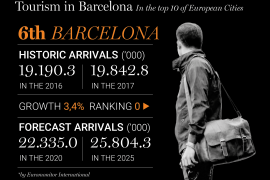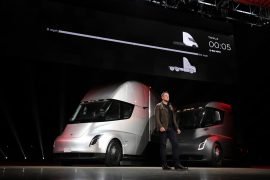E-commerce giant Amazon recently organized its regular appointment with discounts and special offers for its VIP users, Amazon Prime Day. In fact, it’s just over a day, specifically 36 hours. A day and a half of maximum activity that generates a peak turnover that is more than important for the platform, with revenues estimated at 3,600 million euros for this edition. And this, despite the call for strikes in several European logistics centres (including one located in San Fernando de Henares, Madrid). Nothing seems to stop this appeal to online consumerism, which while it lasts is one of the top search terms on Google in any country in the world.
Perhaps where Bezos and Jack Ma(Alibaba) differs from the other usual names amongst the ranks of the world’s wealthiest is that not many years ago they were pretty much unknown to most people
Amazon founder Jeff Bezos is also one of the stars on the social networks these days after Forbes magazine classed him as the richest man in the world and the wealthiest in modern history, with a fortune of around 150 billion dollars. At 44 billion sits China’s Jack Ma, the founder of Alibaba, Amazon’s Asian alter ego, as one of the greatest fortunes in that continent. Perhaps where Bezos and Ma differs from the other usual names amongst the ranks of the world’s wealthiest is that not many years ago they were pretty much unknown to most people. Their empires are gigantic, but they have been built in very little time, at the same pace as consumer online commerce has grown. It is the business activity in vogue, the deal of the century.
According to figures from the National Commission on Markets and Competition (CNMC from the Spanish Comisión Nacional de los Mercados y la Competencia), online commerce turnover in Spain in the last quarter of 2017 reached a record figure of 7,785 million euros, an increase of 26.2% over the same period in the previous year. In the whole of 2017, this trade generated sales exceeding 30 billion euros, up 25.7%. These figures show that this is now a consolidated activity, which goes far beyond the purchase of tickets and travel bookings, although this segment continues to dominate in absolute figures. Specifically, according to CNMC data, apart from this pioneer segment, it is in clothing, sports or cultural shows, games and betting, passenger land transport, or TV subscriptions where most online sales concentrate.
The CNMC figures also clearly show the spectacular progression of this trade in recent years. In the first quarter of 2012, it generated a turnover of around 2.5 billion euros, that is, less than one third of that recorded during the last quarter of 2017.
The volume of this trade is so high that the National Statistical Office (INE, from the Spanish Instituto Nacional de Estadística) has decided to include it in the Household Budget Survey, which every year tries to outline the way Spanish homes consume. According to the INE, in 2017 one in four households (25.7%) made at least one purchase online, compared to 21.6% the previous year. On average each home bought products or services worth 1,723 euros. According to another study by Moody’s, electronic commerce in Spain will exceed 15 billion euros in 2022, with rates of growth of between 12% and 15% per year until then. This volume will position Spain above other larger European economies such as France or Germany.
Amazon turnover for the Spanish market was 4,241 million euros in 2017, fulfilling 53,014,442 orders. Dizzying figures that set them well above the second rated firm, China’s Alibaba group subsidiary Aliexpress, which summed sales of 1,234 million euros through 16,904,994 orders
We won’t leave Amazon yet. Figures published by e-commerce trade journal eShow Magazine reveal that the multinational founded by Bezos is the undisputed leader of this sector in Spain. According to the ranking published annually by the magazine, Amazon turnover for the Spanish market was 4,241 million euros in 2017, fulfilling 53,014,442 orders. Dizzying figures that set them well above the second rated firm, China’s Alibaba group subsidiary AliExpress, which accrued sales of 1,234 million euros through 16,904,994 orders. The other players in the top 5 in the ranking, El Corte Inglés, eBay and PC Componentes did not exceed 700 million euros.
Coming up behind this impressive presence on the market, the American giant has just announced that it will make a fresh investment in another logistics operation in Catalonia, the seventh. The premises, with over 50,000 m² or 538,000 Sq Ft, will be located in Barberà del Vallès, just outside Barcelona. The company has chosen Catalonia as one of its main distribution hubs in southern Europe, attracted by the strategic location of the territory, well connected to the French border via the AP-7 motorway.
All the major retail brands have intensified their commitment to the online channel in recent years. Giants like Inditex, the world’s largest distributor in the textile sector, already makes 12% of its sales in this way, and more traditional companies such as El Corte Inglés have just launched a same-day delivery service to try to counter the strong competition from Amazon’s sales platform. In fact, the delay in adapting the digital strategy of the department store group was one of the issues that led to the recent internal crisis that ended with the sacking of chairman Dimas Gimeno.
However, although no one doubts that the capacity to generate online sales is vital to the survival of brands (including SMEs), the truth is that e-commerce still has pending challenges. One of the most obvious is that sales are still predominantly in the mid-to-low price ranges. Although 74% of Spanish online users aged between 16 and 65 have made online purchases in the last year, these percentages would drop considerably if only the most valuable purchases were accounted for. However, there are already some car brands that have boldly begun to sell new vehicles online. Seat is a good example. The manufacturer announced in April its entry in the Norwegian market, where it has launched its first online store for direct sales.
Another challenge is efficient delivery, that is, the logistics side of the entire process. Amazon’s multimillion-dollar investments show the constant need for more and more infrastructure to be able to offer the customer a positive shopping experience, which means more and more deliveries in very few hours. But not everyone is able to make this investment effort and for that reason there are already warnings of the danger of concentration in a few groups in the electronic commerce sector. Another challenge is technology. Statistics show that most Internet users do not perform their operations through computers, but increasingly do so through their mobile phones or other devices such as tablets. That’s why brands must have well-developed applications, because selling online today does not necessarily mean selling through the web.





















